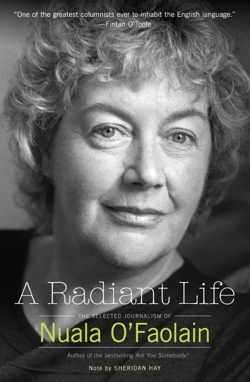
A Radiant Life
The Selected Journalism of Nuala O'Faolain
The late journalist Nuala O’Faolain, (Oh-FWAY-lawn) was prized in her native Ireland for good reason. Unafraid of correlating political and private issues in her columns for the Irish Times, she trained her light on the daily lives of her most unremarkable countrymen, thereby conferring grace upon their many concerns and rare triumphs, all in “the effort to tell a more complex truth.”
A Radiant Life collects O’Faolain’s work from 1986 through 2007, a period that follows the country through a surging economic tidal wave and consequent growing pains toward a prosperity she didn’t live to see diminish again. Witnessing the “Disneyfication” of her beloved, solitary landscape, she never begrudged the poor farmers who sold their fields to developers, just as she honored the purest leaders within the Catholic faith while decrying the corporal punishment and sexual abuse condoned throughout her own childhood education.
Of particular concern to her were the ways in which women almost necessarily lead subjugated lives, with examples ranging from Princess Diana to the female Travellers, or gypsies, in Dublin. When O’Faolain ventured into the north to live for a while at her editor’s suggestion, the Troubles came home to her, for the first time from the perspective of the Loyalists. She was a natural empath and wore it openly on her sleeve without being sentimental.
Watching adults learning to read for the first time, something she considered everyone’s birthright, she said this: “It isn’t easy to acquire the skill at the wrong time of your life. These were adults, who talk and think with all of the sophistication of adults, yet they had to go back to being like children…This must be the hardest thing—to be able to run like a hare in your mind, but be hobbled by words.”
Lucky for the audience who found a place in her heart, simple, conversational words were this writer’s currency. She exercised compassionate critical judgment evenly over a range of additional topics such as September 11, the value of the Irish language, aging, and abortion. To O’Faolain forces other than economics and power, such as miracles and feelings, operated just as meaningfully in her readers’ lives and she considered it her duty to celebrate that fact.(
Reviewed by
Julie Eakin
Disclosure: This article is not an endorsement, but a review. The publisher of this book provided free copies of the book to have their book reviewed by a professional reviewer. No fee was paid by the publisher for this review. Foreword Reviews only recommends books that we love. Foreword Magazine, Inc. is disclosing this in accordance with the Federal Trade Commission’s 16 CFR, Part 255.
